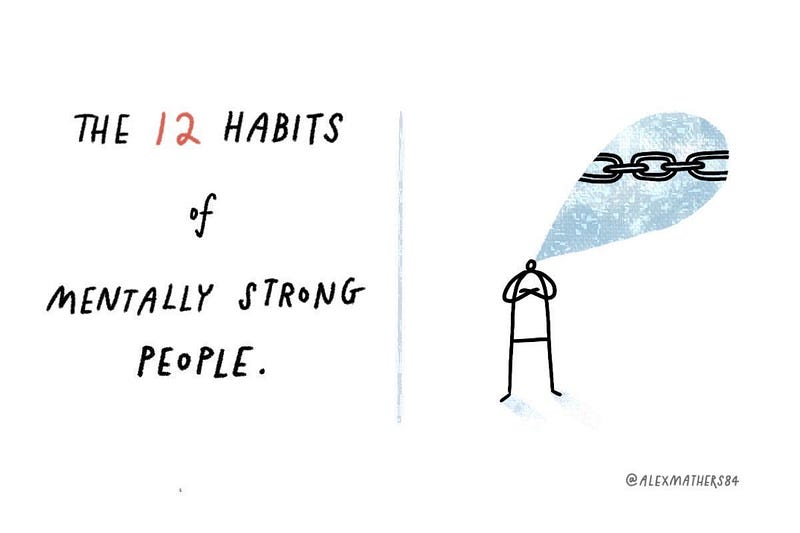
How to stop taking things personally so you experience less stress in life
“If you want to improve, be content to be thought foolish and stupid.” — Epictetus
One of the most valuable truths I picked up learning Eastern philosophy was the idea of ‘no-self.’
What does that mean?
We all have a ‘self,’ surely?
Well, it turns out that when we really take a long, hard look at who we are, we see that the idea we have of what a self is — is an illusion.
Our ‘self’ is a web of ideas, judgements and images that have accrued through our lives. And they float around in the dark recesses of our skulls.
Because these images and ideas are just thoughts, they aren’t real. They are just thoughts.
We may have blood, skin and bones, but what’s underneath it all?
Who are we when we’re able to observe our thoughts about who we think we are?
Who are you, really?
Something to reflect on…
So, what do I mean by taking things personally?
This is when we act based on a perceived sense that we have something to lose or need something to protect.
The idea that we have something to protect is you responding to an idea of who you think you are. You’re reacting to an idea and nothing more.
Maybe someone criticises you, and you feel that burn of annoyance rise up in you, prompting you to yell at them in return.
That’s a strong example of taking something personally. In many instances, we can get angry based on an assumption. Maybe someone said something you took to be about you but was totally harmless.
They make a positive comment about the jumper you’re wearing. But you interpreted it to be sarcastic and got angry.
That’s taking things personally.
You are acting as though the ‘self’ — that bundle of thoughts you have about you and your personality — is a real thing.
Because you believe yourself to be real, you act like there’s something tangible to protect. You get defensive. This just creates unnecessary stress.
Truly mentally free and resilient people don’t take this concept of ‘self’ so seriously because they get it. They know it’s just a thought. So they’re much less protective over it.
They are relaxed, and they respect themselves.
Ah, you cry. You said it, Alex.
You said: ‘They respect themSELVES.’
I know what you mean. But the ‘self’ we’re talking about here, and the self I’m talking about in this whole book, is a different kind of ‘self.’ It’s the self that exists beyond our personal thoughts and judgements.
It’s who we are when we’re totally aware. It’s a spiritual self. The Buddhists would say, it is awareness itself. That’s who you are.
We experience a sense of self-respect when we let go of all this additional thinking. In this way, we simply are. We’re ok with who we are. We are at ease and don’t even need to know why intellectually.
This is what I mean.
When we allow our egos to exert itself unchecked and we move through life immersed in the world of illusion, emotion and overthinking, we can very easily make things about us.
You wanted to buy this book to look, feel, and be treated better. Right?
These are all good things and worth striving for. However, there is an aspect of this innate need in us that is to our detriment.
We all have an image in our mind’s eye of who we think we are. It’s not real. It can help us in many cases, but it can also hurt us.
If we over-emphasise this idea of who we are, and take it too seriously, and create the very real and very strong sense that a part of us needs protecting, we can put ourselves in trouble.
Because if we take ourselves seriously, and we want to appear good and dare I say it for many — perfect, we are immediately stunted.
Many of us develop a life strategy around avoiding mistakes and steering clear of appearing ‘wrong,’ disrespected or ridiculed.
Because of this, we become overly protective of ourselves and react strongly to perceived attacks on this sense of self.
You’re reacting to an illusion. You can’t take jokes. You can’t put a foot wrong. You can’t laugh at yourself anymore. You become overly uptight.
I’ve been like this and can even lapse into these states today, but they don’t last as long.
Taking things seriously and falling into a mope is no fun, and it is not empowering.
It’s no fun for anyone or you. It will diminish the respect people have for you. And again, it’s all about perception.
If you show yourself to react or get annoyed at the idea of someone else undermining you, you lose. Why? Because you show your insecurities. And they’re not even based on anything solid!
People who react to things and take things personally are responding to nothing more than their made-up concept of an inadequate, less-than-worthy ‘self.’
They believe themselves to be less. And so others will believe this to be true, because that’s the energy you give off.
Make sense?
So what’s the alternative?
You must press the hard reset button. Return to a place of strength, which — in a funny way — is to acknowledge the non-physical nature of who you really are.
This means being light-hearted. It means being playful and prioritising a looser and more open — even childlike (though not immature) — approach to living again.
It means not taking things so seriously. We must find a way to be ok with criticism or light jest.
Yes, there may come a point where someone’s criticisms or joking becomes disrespect and drama — in which case, this must be dealt with firmly.
But if you’re huffing, puffing, and stewing over something that in most cases isn’t even an attack directed at you, you’re being immature.
The immature mind thinks it has something to prove.
The mature mind has let go of this need.
The mature mind knows that beneath our personal thinking and our egos and our fraudulent sense of ‘self’ there is simply energy.
We’re all connected this way, and there is beauty in seeing this.
There isn’t anything at the psychological or spiritual level that needs protecting. This is relieving. We can begin to see ourselves in others and others in ourselves.
That’s the vibe you want to be nurturing.
People can sense this vibrant energy a mile-off.
* * *
ACTION STEP:
Detach from the need for self-protection as a daily practice.
Bring awareness to your relationship with your perceived sense of ‘self’ as though you’re watching your reactions and your behaviours as a third-party observer.
Take note of those moments where you feel emotional and triggered when people say certain things.
What you are experiencing is not reality — rather, you experience your thinking around being attacked, disrespected or put down.
It’s all about your perception. And if we’re dealing with perceptions, we’re dealing with lies.
It’s not worth your time. You must find a way to breathe through the frustration. By doing so, like a kind of alchemy, you turn anger into calm, and you may surprise yourself.
Everything improves when you can remain calm and be light with yourself and others.
It’s not about you.
Be assertive and go for what you want in life, yes.
Find your passions, yes.
Enjoy occasional pleasures, sure.
Don’t allow drama and unnecessary disrespect from others into your life.
But don’t take yourself so seriously.
—
Do you want to be mentally stronger than most people?
If you enjoyed this, you will love my free illustrated booklet for you:
‘The 12 Habits of Mentally Strong People.’
Yours free today for a short time, when you subscribe to my Substack newsletter.

